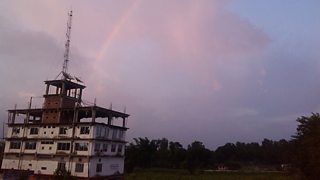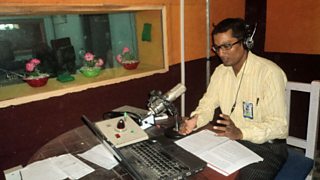Flooding in Nepal: how radio can save lives
Bhuwan Timilsina
Project Manager, BBC Media Action, Nepal
Tagged with:
Every year in far west Nepal, the great river Mahkali brings tragedy to the lives of those living near it. Last month, as the annual monsoon rains beat down, it was no different: severe flooding and landslides claimed at least seven lives, displaced hundreds of families and destroyed vast areas of farmland. Yet more lives would have been lost, however, had it not been for one courageous radio station manager.
Dhirendra Sinal runs Shuklaphanta FM in the town of Kanchanpur. About a year ago, he and his production team attended training run by our BBC Media Action team in Nepal about how to produce ‘Lifeline’ programming – special programming that helps people survive a crisis by providing them with timely, relevant and practical information.

Radio station Shuklaphanta FM in Kanchanpur, Nepal
Alongside staff from two other local stations and key humanitarian workers in the area, Dhirendra and his colleagues took part in a large-scale flood simulation exercise and learned how Lifeline programming differs from news coverage. It doesn’t just tell the world what is happening, but provides useful and accurate information to the people affected by disaster so they can decide what to do next.
That’s why when the rain continued to fall, he knew what to do. “I just tried to practice the knowledge I got from BBC Media Action training last year,” he said.
Putting training into action
That morning, Dhirendra had tuned into local stations and discovered that every single station was reporting news of the landslide in a conventional way. He told me he thought, “OK, let’s not just talk about what’s happening. Let’s do something so we can help people survive the tragedy.”
Most of his staff was unable to travel to the station because of the rising waters. But Dhirendra got on his motorbike and took every possible route to get to the station and started broadcasting at midday.

"Some of the information,” he says, “was very simple but life-saving.” For example, in a flood people become very worried about money, their cattle and other valuable belongings. Dhirendra said his message to people was simple: “Don’t worry about your belongings. Save your life first.”
Broadcasting constantly for the next three hours, he also talked on air about the importance of drinking only boiled water and how people could protect themselves from poisonous snakes in the water.
“I knew that people should move to a safe place, drink safe water and be aware of sanitation,” he said. “So that’s what I did and it worked.”
Saving lives
His show did even more than that by acting as a link between flood victims and rescuers. People phoned in to say where people were in danger so rescue services could respond and save lives.
One caller said that three pregnant women near him had been trapped by the rising water and were in labour. When the local chief district officer heard this, he ordered local police to go in person and rescue them – and they’re now mothers of three healthy baby boys.
One of the mothers, Surja Sharki, later told Dhirendra, “I was trapped in the water and I was in labour pain. Everybody seemed to be busy saving their lives and property, and my husband could not get support from other members of our community. But after a few hours, the police came and rescued us and took us to the hospital. Later I heard that somebody from my village had called Shuklaphanta FM and shared our situation.”
Helping themselves
During his training, Dhirendra had also learned that in an emergency, rescue services can quickly become overwhelmed.
So he made sure to get local leaders on air and asked them to emphasise what people could do to help themselves. One villager from Suda village, Ganesh Nepali, said this made a great impact on him and his neighbours.
“The chief of police of Kanchanpur District said that people should, where possible, try to rescue community members,” the man said. “I talked to my friends about who could help other people and we decided to take families to a safer place. We rescued 17 families [in this way].”
Being prepared
Dhirendra told me his station’s many programmes often don’t have such amazing results. “I am really pleased to see a single episode making such a big impact,” he said proudly.
But he also recognises that his station should prepare for such emergencies in the future. “It would have been better if I had produced some public service announcements and interviews before [the flooding],”he added.
“A radio station who claims that they are for their community should produce programmes that guide people in difficulty. This kind of show can change people’s lives and its impact remembered for many years. So I will encourage other stations to do such programmes.”
Related links
BBC Media Action's work in Nepal
BBC Media Action’s lifeline programming (PDF)
BBC Media Action's resilience and humanitarian response work
